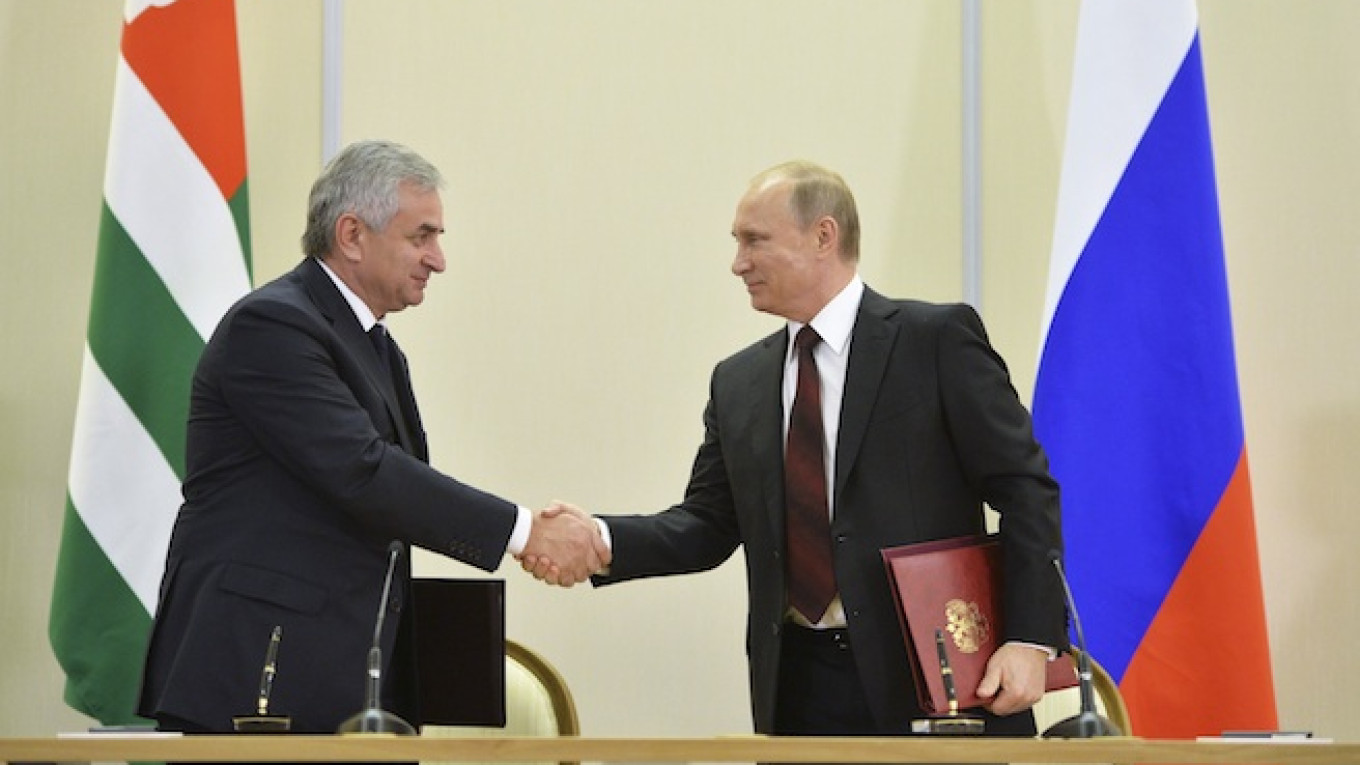President Vladimir Putin's signing of a "strategic partnership" agreement with Georgia's breakaway region of Abkhazia has angered Tbilisi, which said Moscow was looking to annex the territory.
The agreement drew strong criticism from NATO and the European Union.
NATO Secretary-General Jens Stoltenberg said in a statement that the "so-called treaty," signed Monday, did not contribute to a peaceful and lasting settlement of the situation in Georgia and the Western alliance would not recognize it.
EU foreign policy chief Federica Mogherini said in a statement that the agreement violated Georgia's sovereignty and territorial integrity and was "detrimental to ongoing efforts to stabilize the security situation in the region."
Russia and Georgia fought a war in 2008 over Abkhazia and a twin region of South Ossetia, provoking the worst crisis between Moscow and the West since the fall of the Soviet Union.
Following the war, Moscow recognized Abkhazia and South Ossetia as independent countries. Monday's move comes just seven months after Russia annexed Ukraine's Crimea peninsula and threw its weight behind separatists battling in eastern Ukraine.
Putin and Abkhazia's leader Raul Khadzhimba signed the agreement in Sochi, the Black Sea resort across the Russian border from the separatist region.
Georgian Foreign Minister Tamar Beruchashvili denounced the move as a "step toward annexation of Abkhazia by the Russian Federation."
"The signing of this document will have a negative impact on the security situation in Georgia's occupied territories as well as in the broader context of European security," she said, adding that the deal infringed Georgia's territorial integrity.
Under the terms of Monday's accord, Putin said Russia would grant 5 billion rubles ($111.4 million) to Abkhazia, whose population of 240,000 comprises a mix of ethnic groups.
The agreement, posted on the Kremlin website, envisages a "joint defense and security space" and stipulates Russian "protection of the state border of the Republic of Abkhazia with Georgia."
It obliges Russia to facilitate "in every possible way" growing Abkhazia's international ties and promoting its global recognition.
Moscow would also ease requirements for Abkhazia residents to obtain Russian citizenship, but it has not voiced plans to annex the territory.
Georgian President Giorgi Margvelashvili called the agreement "absurd and illogical."
Some Georgian officials say Putin may now sign a similar deal with South Ossetia, which already depends on Russia's financial and political support, although it has less strategic, geographic importance for Moscow than Abkhazia.
Estonian Foreign Minister Keit Pentus-Rosimannus said Monday that the agreement manifests Russia's desire to annex a part of Georgia, according to a statement posted on the ministry's website.
Speaking at a meeting with her Swedish counterpart Margot Wallstrom in Stockholm, Pentus-Rosimannus said “the step is in violation of Georgia's sovereignty and territorial integrity and is contrary to international law, the commitment that Russia has made before the Council of Europe and to the so-called six-point peace plan.”
(Reuters, MT)
A Message from The Moscow Times:
Dear readers,
We are facing unprecedented challenges. Russia's Prosecutor General's Office has designated The Moscow Times as an "undesirable" organization, criminalizing our work and putting our staff at risk of prosecution. This follows our earlier unjust labeling as a "foreign agent."
These actions are direct attempts to silence independent journalism in Russia. The authorities claim our work "discredits the decisions of the Russian leadership." We see things differently: we strive to provide accurate, unbiased reporting on Russia.
We, the journalists of The Moscow Times, refuse to be silenced. But to continue our work, we need your help.
Your support, no matter how small, makes a world of difference. If you can, please support us monthly starting from just $2. It's quick to set up, and every contribution makes a significant impact.
By supporting The Moscow Times, you're defending open, independent journalism in the face of repression. Thank you for standing with us.
Remind me later.


